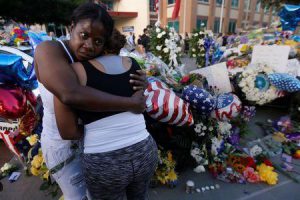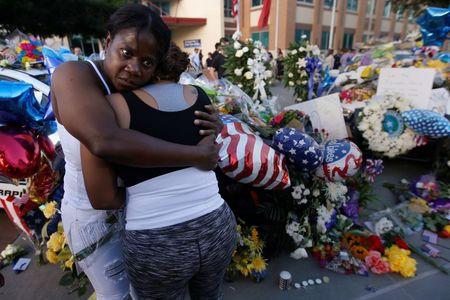
ISSUE: This week in Grey Matters, I want to share with you a story, inspired by a conversation I had with a friend. It’s about the talk that black parents have with their kids about interactions with the police and the police shootings. Let’s examine this topic with a fictional story about Philip and Brooke, and their ten-year old son, Andre.
BACKGROUND: Philip took down the streamers and the banner that read “Happy 10th Birthday.” Brooke cleaned up the cups and paper bowls, careful not to let any of the melted ice cream drip onto the carpet of their new home in an upscale neighborhood in the suburbs of Atlanta.
Their only son, Andre, was playing on his iPad. His dad had promised to take him to the park when they’d finished cleaning up. Every five minutes, Andre asked, “Can we go now?”
“Almost done,” Philip said and crammed into large trash bags all of the wrapping paper strewn across the bonus room.
“I’ve got an idea for a game we can play,” Andre said. “You race my car, and I’ll try to shoot at it.”
Brooke had bought her son a remote-controlled racing car, and he’d been playing with that all afternoon, finally figuring out how to drive it without crashing into trees. Andre’s best friend Logan had bought him a Dart Gun Super Set, which included replicas of an M4 rifle, M16, AK-47, MP40 and a full-sized Uzi.
Andre picked up the Dart Gun Super Set. “Look, mom. Logan left the price tag on it.”
Brooke went over to the box and scraped off the $49.99 price tag. She looked at the guns through the plastic. They were all life-sized and looked like the real thing except for a bright orange tip at the end of the barrel.
“Go put on some different clothes if you two are going to the park,” Brooke said to Andre. As soon as she’d heard him running up the stairs, she showed the box to Philip.
“You know he can’t play with these,” she said.
“Why not? They’re fake.”
“But they look real,” Brooke said, shaking her head.
“But they’re not real,” Philip said. “He can’t hurt anybody with these.”
“They’re dangerous,” she said.
“They just shoot little plastic darts.”
Brooke opened the box and slid out the AK-47 from the hard plastic inset. She put the butt of the gun against her shoulder and pointed it at Philip. She’d been in the Navy for four years and knew how to handle firearms. “Don’t you think that this looks dangerous?”
Philip shook his head. “Boys like to play with guns. It’s what I did growing up.”
“Things have changed, Philip. What do you think is gonna happen when Andre is at the park with this replica AK-47? You don’t think someone is gonna call 9-1-1, and the police are gonna come with guns blazing?”
“I’ll be with him,” Philip said. “We don’t live in a black neighborhood anymore. We don’t have to worry about that.”
“The fact we live in a white neighborhood is all the more reason I’m worried. I’m sorry, but I still get looks from the neighbors like we don’t belong here. I was at the mailbox the other day trying to get it open.”
“That mailbox sticks when it’s hot outside,” Philip said.
“I know that. That was my problem.” She loved and hated that Philip only saw the best in people. This was one of the times it irritated her. “So I’m fighting with this mailbox trying to open it, and this woman in her Mercedes slows down, rolls down her window, and then asks if she can help me. She thought I was trying to steal something from my own mailbox!”
“I’m sure she was just trying to be helpful,” Philip said.
“What I’m trying to tell you is that being black in an all-white neighborhood is gonna be worse in this case. Yeah, we moved here because we didn’t feel safe anymore in our old neighborhood with the gangs and the drugs, but living here, we have other things we have to be careful about. And allowing our son, a black boy, to have a realistic looking gun at a public park is a bad idea.”
Philip put his arms around Brooke and hugged her tight. “I know you’re right,” he said, “but how do I explain to Andre that it is ok for Logan to play with guns, but he can’t?”
“Andre is too young for us to have that conversation with him.” Brooke wiggled out from Philip’s embrace. “He’s still my baby. You can’t tell him that some people in the world are afraid of him just because of the color of his skin!”
Andre bounded down the stairs wearing one tennis shoe and holding the other. He stuffed his foot into the shoe and then asked his dad, “Ready?” He went and picked up the AK-47 his mom had been holding. He’d seen enough television to know how to hold the gun, and he “shot” at different things in the room, pulling the trigger and making “bang” sounds.
“First, we need to talk,” Philip said and took the gun from his son. “Your mother and I don’t think you should play with these at the park. You can play with them inside or outside but only in our yard.”
“Why?” Andre asked. “This weekend, Logan and Hunter and I are gonna play war in the woods. Hunter’s got green face paint and everything.”
Philip put his arm around his son and pulled him in close. “It’s not safe for you to play with those guns. People might think they’re real.”
“But I wouldn’t hurt anybody even if they were real,” Andre said and pushed his father away and went and picked up the M16.
“Your mom and I know that. But the police may not know that.”
“The police?” He dropped the gun, and the plastic clattered against the tiled floor. “You think they’ll kill me, like they did Tamir?” Andre asked.
Brooke sucked in air through her teeth. She had tried to hide Tamir’s death from her son. “I don’t think. . .” she started to say, but that was exactly what she was worried about. “The police are there to protect us, honey.”
“Then why do they kill black people?” Andre asked.
“The police are trying to do their jobs,” Philip explained. “Their jobs can be very dangerous. And some of them are afraid of us. And when they have to make a split second decision, they sometimes make the wrong choice.”
“But I don’t understand,” Andre said. “Why would a policeman want to kill me?”
COMMENTARY: I recognize that this story doesn’t reflect all viewpoints of the police shootings, and as a white man without kids, I don’t intend that this story provides any guidance on how parents should talk to their kids about current events. But this story does represent a viewpoint shared by many in the African American community.
When I first wrote this story, I was filled with an incredible sadness. It is depressing that Brooke and Philip had to tell Andre that he couldn’t play with the guns he got for his birthday, when his friends, Hunter and Logan wouldn’t have the same worries about playing with guns. But Philip and Brooke realized that there are too many variables to take the chance. Everyone has a cell phone, and it only takes one person who sees a black kid with a replica AK-47 to involve the police. And it only takes one racially prejudiced cop to overreact in a situation and shoot and kill a kid.
In researching this Grey Matters, I came across several articles trying to debunk the widely-held belief that our nation faces a problem: police officers are shooting black men and kids without sufficient justification for use of deadly force. They quote statistics that say police officers shoot white suspects more often than they shoot black suspects. But in my view, all the statistics and data are irrelevant. If enough people believe something is a problem, then that belief needs to be addressed or it becomes a problem.
Note that the opposite of that isn’t true. If enough people believe something isn’t a problem, then that something may still be a problem. It’s just not a problem for the people who don’t believe it’s a problem. Some people don’t think prejudice exists because they haven’t been on the receiving end of it. As a gay man, I know that homophobia and discrimination against gay people exist because I’ve witnessed it firsthand.
I’m sorry, but white people cannot tell black people that police shootings aren’t a problem. Denying the problem leads to more problems. The tragic shootings of Dallas police officers demonstrate that point. We can’t ignore this problem because we think it only affects someone else. We can’t let this be “us” versus “them.”
In the wake of the Dallas shootings, communities were coming together and holding vigils instead of protests. But after the candles have burned out, what do we do?
I propose one thing. It’s not a solution to the whole problem, but it will certainly help. Police across the nation decide a protocol. They tell us all how we are to react when we’re pulled over and how they’re going to react. And they go out into the communities they serve and they teach people these procedures.
Here’s what this might look like:
A cop pulls you over. He flashes his lights a couple times. You get your driver license, insurance card and vehicle registration, and you get out of your car with those pieces of paper held over your head. He gets out of his car and takes the papers. You turn around and face the back of your car while he runs your information. He returns and gives you back your info, questions you further or arrests you.
We can have procedures for the questioning. This is something that can be taught in schools. It will mean that everyone is treated the same and will help police discern real threats to their safety.
This solution doesn’t solve the whole problem, but it’s definitely a start.
